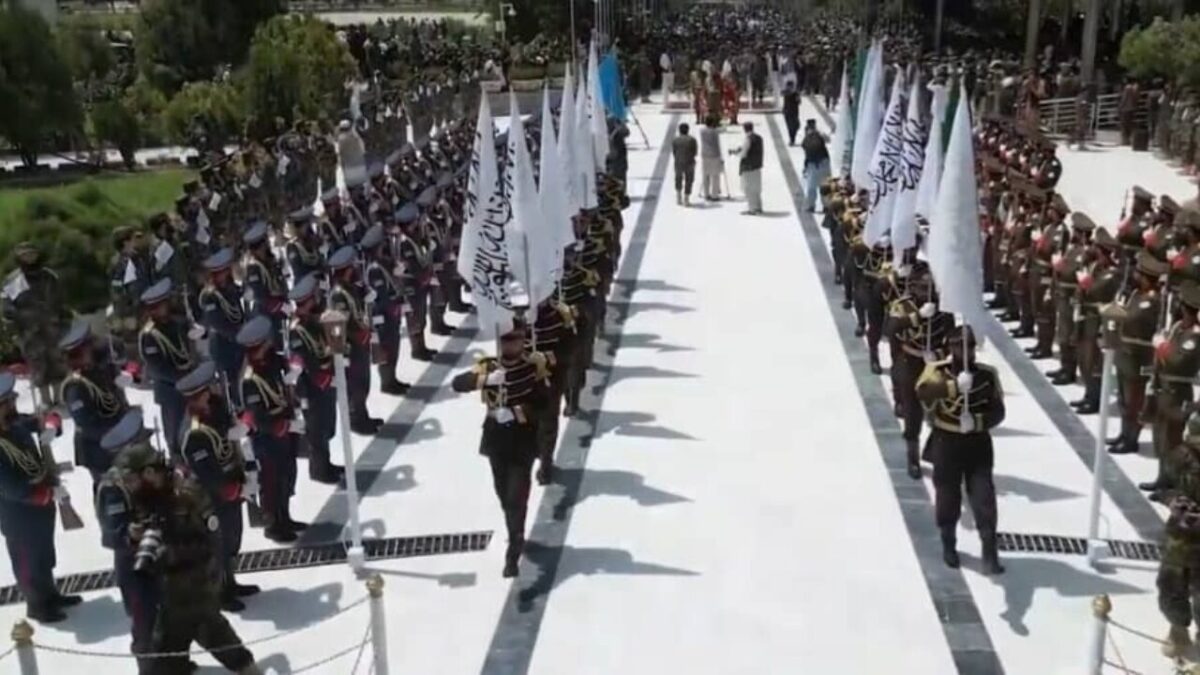KABUL, Afghanistan — Taliban on Sunday marked the 105th anniversary of Afghanistan’s independence from Britain, despite internal opposition to symbols associated with King Amanullah Khan and the country’s former national flag.
Last month, Taliban fighters destroyed a statue of King Amanullah Khan in Torkham, replacing it with their own white flag. This act highlighted the ongoing tension within the Taliban regarding the legacy of King Amanullah, who is credited with leading Afghanistan to independence on August 19, 1919.
At the commemoration event, Fasihuddin Fitrat, the Taliban’s Chief of Army Staff, declared, “We celebrate the 105th anniversary of our country’s independence while Afghanistan is truly free and independent.”
However, these celebrations occur under a cloud of controversy. In a recent television interview, Mohammad Yaqoob Mujahid, the Taliban’s Defense Minister, acknowledged that Afghanistan under Taliban rule remains “occupied” by American aircraft, urging the United States to respect Afghan airspace.
Abdul Ghani Baradar, Deputy Prime Minister of the Taliban, also spoke at the ceremony, describing the day as a proud reminder of the sacrifices made by Afghans in their struggle against British colonialism. “This celebration is a tribute to the unity and resistance of Afghans and mujahideen, who, with limited resources, defeated British colonialism,” Baradar said.
Baradar’s remarks come as Neda Mohammad Nadim, the Taliban’s Minister of Higher Education, has recently criticized King Amanullah Khan, accusing him of importing Western “immorality” into Afghanistan. Nadim also condemned the practice of sending girls to school, labeling it a foreign culture brought to Afghanistan by King Amanullah and later by King Zahir Shah.
During the same event, Defense Minister Mohammad Yaqoob Mujahid stated, “We do not accept anyone’s dictates and obey only our own leaders,” a remark that stands in stark contrast to the repeated calls from international and neighboring countries for the Taliban to form an inclusive government representing all ethnicities and groups in Afghanistan.
Political analysts and Afghan citizens have criticized the current Taliban regime as “ethnically and group-exclusive,” accusing them of monopolizing power. In response to these criticisms, Sirajuddin Haqqani, the Taliban’s Interior Minister, addressed Taliban members, emphasizing their duty to protect the freedom they have gained. “It is our obligation to safeguard the freedom we have achieved,” Haqqani said.
These assertions of freedom and independence, however, are contradicted by the sentiment of many Afghan citizens, who on August 15 marked the fall of the Republic and the return of Taliban rule as a “dark day in Afghanistan’s history.” Since their return to power, the Taliban have imposed severe restrictions on the rights and freedoms of women and girls.
Amir Khan Muttaqi, the Taliban’s Foreign Minister, also addressed the gathering, claiming, “Today, the nature of occupation has changed, and weak countries easily fall into the trap of occupation.”
It is worth noting that since the Taliban regained control of Afghanistan, they have repeatedly appealed to the international community for assistance. According to reports, the United States has been providing approximately $40 million in weekly aid to Taliban-ruled Afghanistan, a practice that has drawn criticism from some U.S. senators who have called for its cessation.
Afghanistan, under the leadership of King Amanullah Khan, regained its independence from Britain on August 19, 1919. In previous administrations, this day was celebrated widely, with citizens carrying the tricolor national flag. However, since the Taliban’s return to power, they have dismantled symbols associated with the Republic, replacing the national flag with their own white banner, and have detained and punished those who carry the tricolor flag.





